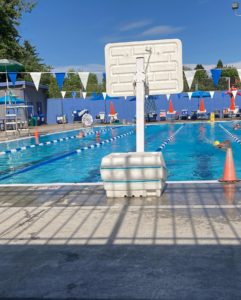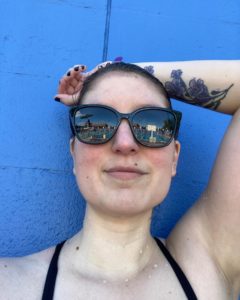Coping | Daily Life | IBD

Image of Lizzie’s town pool.
On a hot day earlier this summer, I found myself lathered up in sunscreen, shifting nervously amidst a line of tired parents and giddy children outside a public pool a few miles from my apartment.
“This is a bad idea,” I kept thinking, rubbing my aching head and queasy stomach, fighting the urge to bolt back to my car and drive home.
“I am getting in that pool,” I repeated over and over to myself.
Finally, a lifeguard shouted, “Anyone here for lap swim? This way!” I was going swimming.
***
I have been swimming for as long as I can remember. Growing up in San Diego, the neighborhood pool was a staple of the community all year long, and bathing suit tan lines and anti-chlorine shampoo felt as natural to me as eating dinner and going to school.
When I was 9, the 2004 Summer Olympics inspired me to try competitive swimming. I started on a small summer team and eventually joined a year-round team. When my family moved to Northern California when I was 12, I was so shy and so anxious that I thought I would never adjust to my new town, new house, new school, new neighborhood…but I found myself at home again at the swimming pool with the local team.
I was never the fastest kid on the team (in fact, I was the slowest kid on the varsity team), and I never really gained that competitive spirit that teammates who went on to swim in college had. But I *loved* to swim. Morning practice at 5 a.m. at an outdoor pool in January, plus evening practice, totaling over 3 hours of lap swimming in one day? Sign me up! Something about the rhythm of the strokes, the soothing repetition of turning over lap after lap, grounded me, no matter the challenges life brought.
When I moved to Portland in 2017, right after college, I again found myself making a home out of the community pool. I didn’t know anyone in Portland—had never even been to Oregon before moving here—but starting every morning off with the familiar smell of chlorine and fellow lap swimmers washed away my fears.
At least, it did until my Crohn’s diagnosis came along, 7 months after I moved here.
***
In the first year of my diagnosis, I used swimming to reassure myself that I was still “healthy enough,” even if I was “a little sick.” “As long as I’m still strong enough to swim, then it’s not that bad,” I told myself over and over.
“I can take whatever pain and suffering this illness brings me, as long as it doesn’t take swimming,” I thought, dragging myself through a miserable few laps before collapsing into the hot tub, refusing to admit to myself that I should be at home in bed.
Finally, the start of the Covid-19 pandemic and several months of excruciating bloody diarrhea with severe fatigue stopped me. The loss of my favorite pastime hurt even more than the agonizing Crohn’s cramps that I had to bite a towel to ride out. I could no longer swim.
***
Whenever I tell a new doctor or therapist about my journey with Crohn’s, I always say that my Crohn’s diagnosis was a catalyst, igniting other chronic physical illnesses and exploding previously undiagnosed mental illnesses. Suffice it to say, these last few years have been more difficult than even my overly pessimistic brain could have predicted.
Even still, aspects of my health have gradually gotten better over the last year. My Crohn’s finally reached remission after nearly 3.5 years of medication trials, thanks to a combination of a biologic and an immunomodulator. My eating disorder recovery has allowed me to enjoy nutritious foods again, which my body desperately needed. I still struggle with fatigue and pain, and a recent diagnosis of chronic migraine has rattled my wellbeing in crushing ways. But I finally have enough energy to get myself to the pool.
***
That hot summer day, just over a month ago now, I beamed as I swam my first few laps in years. To feel a few moments of joy, power, and peace in my body after all I have endured medically and mentally…feeling my body just naturally fall back into the rhythm of the strokes was one of the most glorious moments I have ever experienced. I looked around me at the other swimmers, going about their sets, unaware of a dream coming true right beside them.
“Do you know what this body has survived in order to live to see this moment?!” I wanted to cry out as I climbed out of the pool at the end of my swim. It didn’t matter that I couldn’t swim as fast or as long, or as well as I used to. All that mattered was that I could swim again.
***
Some people reading this may think that I have “overcome” my Crohn’s, that I worked hard and defeated Crohn’s because I’m strong and refused to let Crohn’s win!

Lizzie relaxes after swimming laps.
I would love to believe that, because it would mean that I have control over my body, that humans in general have more control over illnesses than we really do. It’s true that I’ve made responsible choices in terms of the aspects of my health that I do have control over, and that I’ve learned to live *with* my body’s limitations, rather than fighting against them. But also, I got lucky. A drug finally worked well enough to put my Crohn’s into long-term remission, after others failed. My adrenal glands happened to recover from steroid-induced adrenal insufficiency, even after my endocrinologist said they probably wouldn’t. I have the privilege of accessing healthcare providers who listen to me and fight for me, and medicines that save me with every dose.
I am not naive anymore. I know I may not have this level of health forever. I know that life is so much more fragile than most of us care to admit. I know how devastating, brutal, and just plain cruel Crohn’s can be. Now, I savor my swims in a way I never did before. I marvel at my body’s ability to carry me across the pool. I feel my heart pounding with gratitude and joy with every stroke I take, lap after lap, gliding through the water one arm after another, coming home to myself.
